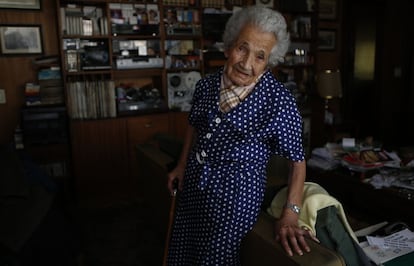The Spaniards who are breaking the 100-year age barrier
The number of centenarians in Spain has more than doubled in the last 15 years, census figures show

When Nicanor Parra celebrated his 100th birthday in 2014, the Chilean poet and mathematician attributed his longevity to one of the South American country’s traditional dances, saying: “It’s thanks to the cueca that I’m still here.”
María Antonia Núñez, the daughter of Spain’s oldest man, 111-year-old Francisco Núñez, puts her father’s long years down to his approach to life and his surroundings: “He’s always worked in the fields, and his character has also played a big role.”
Ciriaca González, 107, has her own explanation: “I love my work more than anything… and I never married.”
The oldest woman in the country is Ana María Vela, aged 114
In short, each of the 14,487 centenarians in Spain probably has their own thoughts as to why they have lived for so long. But whatever the reasons, the simple truth is that Spaniards are living longer than ever: the figure has more than doubled since 2000. By 2029 that figure will be more than 46,000, and by 2064 it will have reached almost 373,000, according to National Statistics Institute estimates.
Good genetics
“If you have the right genetic code, a healthy life based on the right diet, regular exercise, clean air and a social life are what determines if a person will live to be a hundred or beyond,” says Consuelo Borrás, a physiologist at the University of Valencia who has carried out several surveys on longevity.
“The number of people who will reach the age of 100 depends on how many of them were born on a given date and what their life expectancy is,” says Pau Miret, a researcher at the Barcelona-based Center for Demography Studies.

“The generation of 1929 was born into a global depression and then lived through the Spanish Civil War as adolescents, but those born in 1964, who will be 100 in 2064, are part of a Spanish baby boom with an ever-longer life expectancy after they reach 50. As of January 1, 2015, there were more than 700,000 of them, and based on this the National Statistics Institute calculates that half of them will live another 50 years or more,” says Miret.
The number of Spaniards reaching the age of 100 is growing by around 10 percent a year, and this rate is expected to rise: over the last decade the number of people aged 85 or over has increased by half-a-million people, all of whom are helping raise the life expectancy of Spaniards to 83.2 years, according to the OECD. This is the highest figure in the world after Japan, at 83.4 years.
Happy 107th birthday
At 107, Ciriaca González is the fourth-oldest person in the Madrid region. The oldest woman in the country is Ana María Vela, aged 114. It’s no coincidence that both are women: 80 percent of centenarians are.
Every day, aided by her 74-year-old nephew Vicente, with whom she has lived for the last two decades, she takes a brisk five-minute walk from her home to her local bar, where she has a light lunch of rice or soup, plays cards, and remembers old times while enjoying a glass of red wine.
Ciriaca, who grew up in a tiny community in the central province of Segovia, says she learned to read “without paper, pen, or ink” by copying the letters she saw in her father’s books with a stick, tracing them on the ground. Today, she can still recite poems she learned as a small child. She soon left the countryside, spending 40 years working in kitchens. She never married, saying she didn’t trust men.
Asked what she thinks of Pablo Iglesias, in reference to the leader of the Podemos party, she describes him as “the father of the poor”, referring to the 19th-century founder of the Socialist Party, after whom the younger Iglesias is named. Her favorite Spanish leader is still Manuel Azaña, the first prime minister of the Second Spanish Republic, who was elected in 1931, when she was about to celebrate her 23rd birthday.
“If you have the right genetic code, a healthy life based on the right diet, regular exercise, clean air and a social life are what determines if a person will live to be a hundred”
In the early 1950s, when he was in his late thirties and unaware he would still be alive today, Nicanor Parra wrote: “Something tells me that life is just a chimera, an illusion, a dream without a shore, a small, passing cloud.”
More and more Spaniards will enjoy that chimera into their second century, and it’s one that Ciriaca continues to enjoy, reciting stanzas from Lope de Vega’s Punishment Without Revenge, which she appeared in at the age of 12: “Here endeth the tragedy, the punishment without revenge, which in Italy caused astonishment, and today is an example in Spain.”
She seems entranced by the words, returning to her childhood for a few moments while the owner of the bar, Conchi, looks on in admiration, and another customer drops a coin into a slot machine, drink in hand.
A longer, healthier life
The consequences of Spaniards living longer lives will be felt in several ways: “Although centenarians live longer lives free of major illnesses, looking after them requires more healthcare. They can also be a problem for their families, and financially, they are a burden. But in my opinion, their experience and approach to life enriches us all,” says Consuelo Borrás.
Tu suscripción se está usando en otro dispositivo
¿Quieres añadir otro usuario a tu suscripción?
Si continúas leyendo en este dispositivo, no se podrá leer en el otro.
FlechaTu suscripción se está usando en otro dispositivo y solo puedes acceder a EL PAÍS desde un dispositivo a la vez.
Si quieres compartir tu cuenta, cambia tu suscripción a la modalidad Premium, así podrás añadir otro usuario. Cada uno accederá con su propia cuenta de email, lo que os permitirá personalizar vuestra experiencia en EL PAÍS.
¿Tienes una suscripción de empresa? Accede aquí para contratar más cuentas.
En el caso de no saber quién está usando tu cuenta, te recomendamos cambiar tu contraseña aquí.
Si decides continuar compartiendo tu cuenta, este mensaje se mostrará en tu dispositivo y en el de la otra persona que está usando tu cuenta de forma indefinida, afectando a tu experiencia de lectura. Puedes consultar aquí los términos y condiciones de la suscripción digital.









































